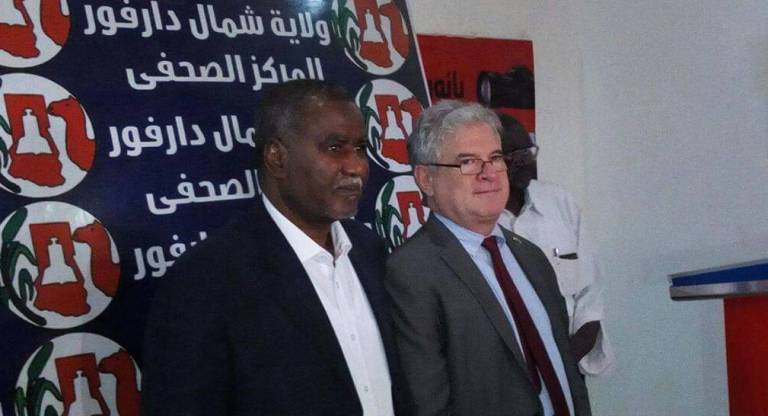Security conditions hinder return of Darfur IDPs: U.S. envoy

June 18, 2017 (EL-FASHER) – The U.S. Charge d’Affaires in Khartoum Steven Koutsis said the security conditions around the Internally Displaced Persons (IDPs) communities obstruct those who seek to return to their places of origin.
Koutsis and his accompanying delegation including the political and economic advisors at the U.S. Embassy in Khartoum besides the USAID representative arrived in El-Fasher, North Darfur state capital on Sunday at the beginning of a three-day visit to the region.
The U.S. diplomat told Sudan Tribune following his meeting with the deputy governor of North Darfur Mohamed Braima this is his first visit to the region, pointing to recent visits by American officials to Darfur.
“The purpose of the visit is to assess the progress made by the efforts of the government of Sudan, UNAMID and the civil society,” he said.
He added his delegation held a series of meetings including with the deputy governor, traditional administration chiefs and the special prosecutor for Darfur crimes, saying they discussed the security, humanitarian and legal situation in North Darfur.
“The traditional administration leaders demanded [government] officials to help IDPs who were unable to return to their areas of origin in fear of the armed militias and criminal elements,” he said.
Koutsis said the IDPs need to gain confidence that the security service is capable of protecting them and that the judiciary could achieve justice.
“Therefore, the government must work with the United Nations, the African Union and partners to build local institutions to protect civilians and provide them with basic services so that they can return to their villages,” he added.
The U.S. diplomat said they will visit the locality of Gulu in Jebel Marra on Monday to meet with government officials and the residents and to inspect the USAID projects in the area.
He added the delegation would also assess the improvement in the lives of residents in areas that received relief, hoping that humanitarian assistance could be delivered throughout the region.
For his part, Braima said he briefed the American delegation on the humanitarian and security situation in the state besides his government’s vision for the future of the UNAMID.
He pointed to the significant improvement in the security and humanitarian situation North Darfur, saying the state is free of rebellion except for some small pockets.
The deputy governor further laid out his government’s plan to address IDPs problems and support voluntary return efforts.
He added the large borders with neighbouring countries poses a real challenge to his government, saying they bear the burden of protecting the national security as well as combating illegal migration and human trafficking.
Briama praised “the recent U.S. openness towards Sudan”, demanding the delegation to put pressure on the neighbouring countries not to interfere in the humanitarian issue or offer support and shelter to rebel groups.
Following recent fighting between the government army and armed groups in East and North Darfur, Sudan said rebel fighters came from Libya and South Sudan. Also, Khartoum accused Juba and Cairo of supporting and providing weapons to the two armed groups. The two neighbouring countries denied the accusations.
The deputy governor pointed to ongoing arrangements to implement the illegal arms collection plan during the coming period, saying social peace and reconciliations are on top of his government’s priorities.
The Sudanese army has been fighting a group of armed movements in Darfur since 2003. UN agencies estimate that over 300,000 people were killed in the conflict, and over 2.5 million were displaced.
(ST)
